| |
|
Friday, April 4: Family Shabbat services at Temple Solel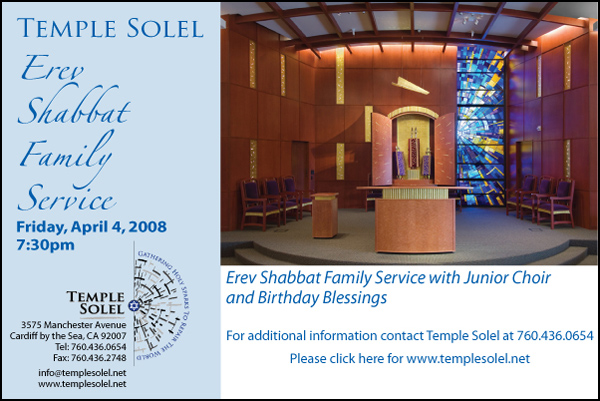
Sunday, April 6United Jewish Federation~Super Sunday
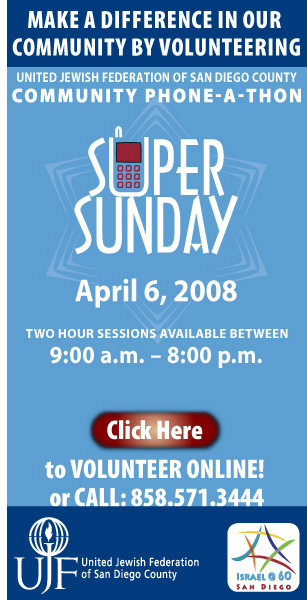
Monday, April 7 Jacob Goldberg Lecture: Iran versus Israel

Friday-Sunday, April 11-13 Mountain Chai~Big Boys Getaway
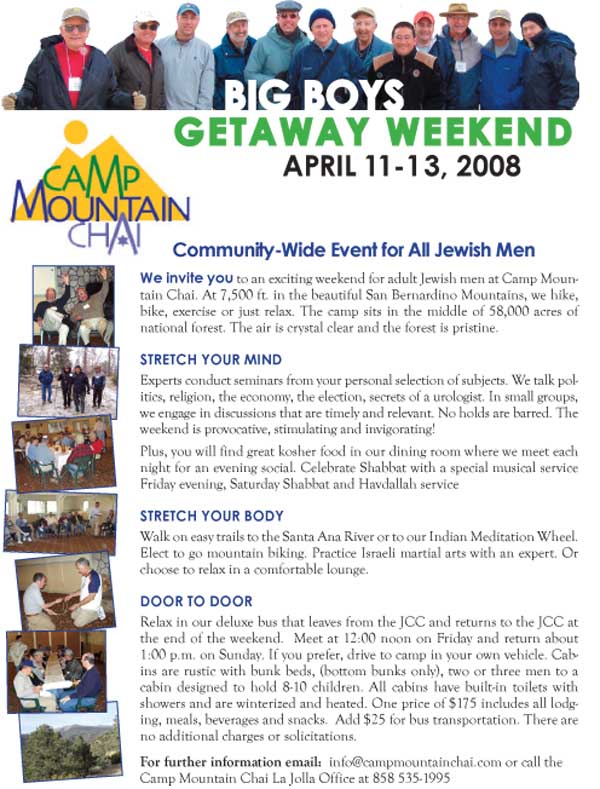
SUNDAY, APRIL 13 Beth Israel~Israel at 60 photo exhibit

Sunday, April 20 Beth Am~Second Night Seder
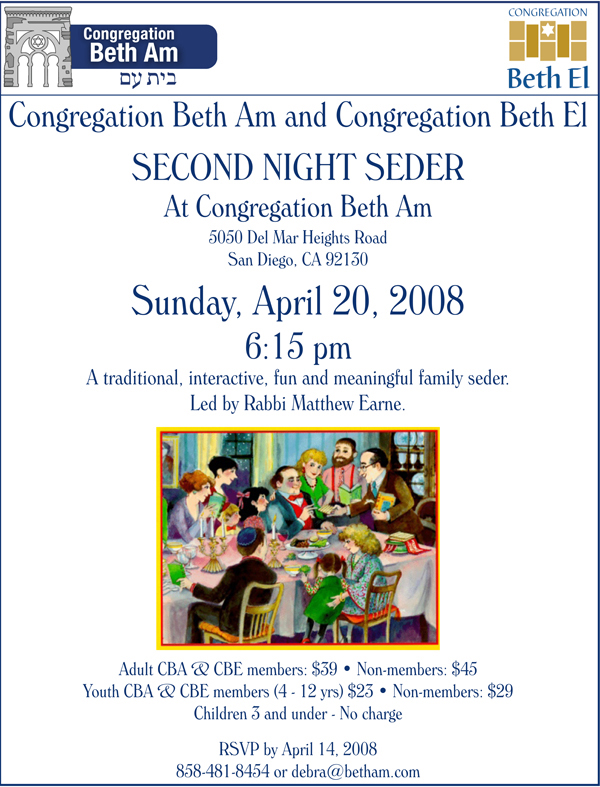
Wednesday, May 28 JFS~Ellen Saks lecture on mental illness
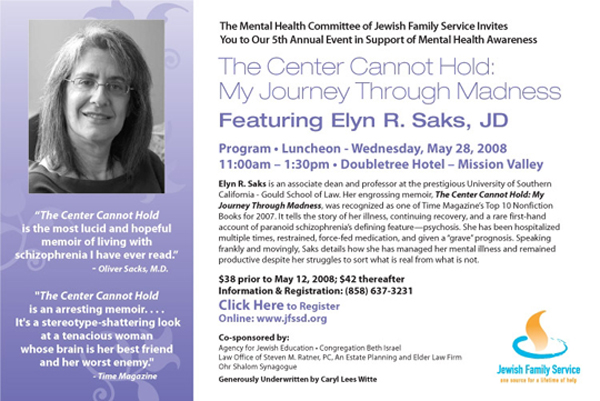

All deaths by violence are not the same
By Rabbi Michael Berk
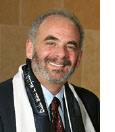 LA JOLLA, California—Last month I wrote a letter to the editor that was published in the San Diego Union Tribune. I was reacting to an editorial which had taken the position that it is not reasonable to expect Israel to negotiate with Hamas, since Hamas only seeks Israel's destruction, not peace with Israel. LA JOLLA, California—Last month I wrote a letter to the editor that was published in the San Diego Union Tribune. I was reacting to an editorial which had taken the position that it is not reasonable to expect Israel to negotiate with Hamas, since Hamas only seeks Israel's destruction, not peace with Israel.
In my letter I said that I was pleased with the editorial, but that I was surprised it made no mention of the fact that the day before, eight Yeshiva students were
murdered by a terrorist in Jerusalem. Here was the main point of my letter:
“The murder in Jerusalem points to a huge moral difference between Israel’s various strategies to protect itself and its citizens and the terrorists’ acts against Israel.The Islamic extremists will target the most vulnerable and innocent and rejoice at the spilling of the blood of children at sleep, studying religious texts, or playing outside. I am not an expert in military tactics, but I do know this: when Israel responds militarily to these kinds of murderous acts, they target militants who are ordering, making and delivering their suicide/homicide bombs. Innocents are killed, sometimes due to error, sometimes because the terrorists operate out of civilian areas that make the death of innocents inevitable. As a religious Jew I mourn their deaths, too.”
In the week after my letter was printed, I received two emails about it. One writer, a temple member, said he was “proud” to have me represent Congregation Beth Israel and affirmed how important it is to get our message of support for Israel out into the community. I appreciate those kind words.
The other letter concerned me. The writer is not a member of the temple, but I am fairly certain he is Jewish. His letter points to a critical task we face in the Jewish community, especially now. The writer thought my “moral relativism” was “unfortunate and irresponsible.” Why? Because, to him, there is in fact no difference between the deaths of those eight Yeshiva students, – who had gone back to the academy for extra credit to study and whose blood splattered over Jewish holy books – and a Palestinian civilian accidentally killed when Israel targets militants. He said explicitly: “The killing of civilians by Israeli soldiers is no more justified than the killing of Yeshiva students by suicide bombers.”
I can hardly describe how this position distresses me. I don't mind someone disagreeing with me and I know people feel this way, but I am nonetheless utterly at a loss to understand how anyone can have such befuddled moral reasoning.
As we celebrate Israel’s 60th anniversary, we need to be aware that the challenges Israel faces are more complex than ever. The prospects for peace seem as dim as ever and with each passing day the “two state solution,” which is the only real solution, becomes more and more difficult to attain. No one really knows what to do.
In the meantime, while we rejoice in Israel’s 60th anniversary, there are those around us who do not marvel at how our beloved Israel has grown and flourished as a modern, secular, democratic state in the middle of the most troubled part of our planet.
So, we must take the advice of the temple member who wrote me and be ever diligent in promoting and standing up for Israel. There is so much ignorance and prejudice out there that we cannot let our guard down.
One of the most important things each of you can do is join ARZA, the Association of Reform Zionists of America, the Zionist arm and voice of the Reform Movement in the United States. ARZA’s mission is, “… to make Israel fundamental to the sacred lives and Jewish identity of Reform Jews. As a Zionist organization, ARZA champions activities that further enhance Israel as a pluralistic, just and democratic Jewish state.”
ARZA provides materials and programs that keep Israel on our agenda and increase our awareness and knowledge about Israel. ARZA also helps us advocate on behalf of Israel in San Diego. In other words, ARZA exists to help educate people — like the letter writer – and helps our community respond to those who do not understand Israel and the enormous challenges Israel faces.
Click here for easy-to-clip coupon; Product available at Ralphs in La Jolla; The Place in College area
|
A U.S. Civil War Story— for Pasover
Private Joel and the Sewell Mountain Seder by Bryna J. Fireside; Kar-Ben Publishing
By Sherry Berlin
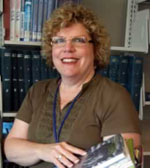 SAN DIEGO—Kar-Ben Publishing has released a new book for Passover this spring season, Private Joel and the Sewell Mountain Seder by Bryna J. Fireside. Rarely do we hear about Jewish participation in American history, particularly in history as early as the Civil War. Private J.A. Joel is a Union soldier, fighting in the Civil War in 1862. After defeating the Confederate forces at Carnifax Ferry, West Virginia, Private Joel and his unit, including twenty-one Jewish soldiers, spend the spring hunkered down near the Sewell Mountains. SAN DIEGO—Kar-Ben Publishing has released a new book for Passover this spring season, Private Joel and the Sewell Mountain Seder by Bryna J. Fireside. Rarely do we hear about Jewish participation in American history, particularly in history as early as the Civil War. Private J.A. Joel is a Union soldier, fighting in the Civil War in 1862. After defeating the Confederate forces at Carnifax Ferry, West Virginia, Private Joel and his unit, including twenty-one Jewish soldiers, spend the spring hunkered down near the Sewell Mountains.
This story begins two weeks before Passover, as J.J. and his Jewish friends are wondering if "Old Rosy" (Commander William S. Rosecrans) will allow them to hold a seder. Old Rosy recognizes that most of the young soldiers in his regiment have never been away from their families, and so not only does he give them permission to have the seder, but leave time to prepare. He announces to them, also, that he would be delighted to attend.
As word spreads through the regiment about the celebration, three Negro soldiers who had joined their regiment, approach Private Joel, "me and my buddies know something about your Hebrew Passover." Caleb Berger had been a slave to Master Berger, who was Jewish. He had taught Caleb to read some English and Hebrew and had helped him earn his freedom. He and his two friends Abraham and Samuel, who were still slaves, had escaped to fight the war "to free us" and found the 23rd Regiment.
During the two weeks before Passover, the Jewish soldiers and the three Negro recruits figure out how they will get the supplies needed for their seder. Mr. Greenberg, a Jewish man who traveled with the troops and sold them supplies, told them he would send back matzah on the next supply train. When the train arrives there is enough matzah for the week and some Haggadot and prayer books. Everyone works together to gather the proper foods for the seder plate and the meal from nearby farmers. They found cider that had been sitting around all winter, that they could use for wine. So they celebrated their seder with 27 men and an extra chair for "the stranger." This was a seder that no one would forget.
This book, based on a true story that appeared in The Jewish Messenger from April, 1866, is a wonderful way to teaching about the Jewish involvement in American History. Through Fireside's imagination, we get to see what a seder would have been like under those circumstances. This year as we sit at our seders, it is good to be reminded that there are always people who are not free. This book gives us a story from the Civil War showing that the Jewish people have never forgotten how good it is to be free.
And there is even a local angle, though its not mentioned in the book: General Rosecrans was the man for whom Rosecrans Boulevard in Point Loma was named. After the Civil War, he came to San Diego and was among the city leaders active in trying to bring a railroad here.


JEWISH MEMORIES
Seders connect family and community
By Rick Schwartz
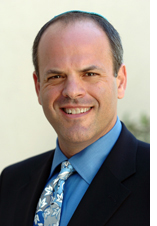 SAN DIEGO—Shalom! Pesah, known in English as Passover, is one of my favorite times of the year. As we approach Pesah I am reminded of seders I attended in Brooklyn, NY when I was growing up. Even though my parents moved away from the New York area when I was very young, we would often go back to Brooklyn for Pesah. All seders in Brooklyn were in my grandparents' small apartment on Ocean Parkway. SAN DIEGO—Shalom! Pesah, known in English as Passover, is one of my favorite times of the year. As we approach Pesah I am reminded of seders I attended in Brooklyn, NY when I was growing up. Even though my parents moved away from the New York area when I was very young, we would often go back to Brooklyn for Pesah. All seders in Brooklyn were in my grandparents' small apartment on Ocean Parkway.
Pesah was the one time every year when cousins, aunts, uncles and friends of the family came together. Every year 30 plus poeple crammed into my grandparents' apartment, and there was never a complaint about making room for the extra person or two who showed up in time for Seder. Dinner was served on a collection of kitchen tables, card tables, "TV" tables and coffee tables that were cobbled together to form a dining room table. In between reading from the Haggadah t here was a lot of laughter, a lot of debating and a lot of eating! In addition to the Four Questions, my father always asked his version of the Four Questions, which usually included trivia questions about famous Jewish athletes. A highlight for the grandchildren was finding the afikomen so we could negotiate an appropriate reward from our grandfather.
Even after my parents moved to California it was important to get back to Brooklyn for the family seder every year. I share this story with you because the importance of family and connection to community was something that was instilled in me by my parents and grandparents. Now as an adult, my wife Jacqui and I look forward to sharing Pesah with our family and freinds, and we make sure our chidlren remain connected to their cousins, aunts and uncles. We have established some new traditions for our seder but one constant theme that we have kept is our commitment to being with family and friends on Pesah. It is important to make sure our children nderstand the importance of connecting to our community...


FROM THE ARCHIVES
Editor's Note: Looking forward to the High Holidays, congregants of Temple Beth Israel in 1922 wrote for The San Diego Jewish Community News a group of articles evaluating where the Jewish community of San Diego had been, where it was at present, and what might be its future. Parenthetical comments ( ) are those of the articles' authors. Comments in brackets { } are those of San Diego Jewish World editor Donald H. Harrison, a historian of San Diego's Jewish community. If any reader can contribute an article to us about the Ypsotpi—what the group's name meant, and what the organization did—we would certainly welcome it.
Our Growth
By Adolph Levi
From The San Diego Jewish Community News, September 20, 1922, page 6
It is indeed with great happiness and pride that I contemplate the remarkable growth of our Jewish Community. When first organized, we met at intervals at the homes of our members, one of our own number acting as reader; today, we have our own Temple {Beth Israel} and rabbi {Rabbi Maxwell H. Dubin}.
Vividly do I recall those days when we began to talk of erecting our own house of worship. It was a difficult task, but thanks to the interest displayed, we succeeded. Many of the members, to facilitate the building of the Temple, bought permanent pews. I mention this latter fact to show the unselfish spirit of our people for when several years ago we found it necessary to repair the building, the members surrendered their pew rights to the Congregation, and now re-purchase seats from year to year.
We have progressed rapidly since securing our own building. Of recent years we have found it necessary, in order to increase our seating capacity, to build a balcony. Our Sabbath school has been put on a modern basis; our choir augmented, and a beautiful new electric organ installed. When I compare conditions, as I found them on coming to San Diego, with those existing today, I fear not for the future, for I know our progress will continue. My hope is to see a new, beautiful temple on our present site, which is conveniently located, and with our present interest, it will not be long before that hope is made a reality. {Editor’s note: Instead of staying at Second and Beech, the congregation eventually purchased property at Third and Laurel Streets.}
Looking Backward
By Samuel I. Fox
From The San Jewish Community News. September 20, 1922, page 6
Religion which is a part of our life, a guide to our conduct, has most to do with our future. But as that future is hidden from us, the past is therefore left as the only means whereby we may improve in knowledge. Let me then tell you a little of the past: undoubtedly other men could tell it better than I.
About 1862, a few men residing in Old Town (now North San Diego), started a congregation called Adath Jeshurun. The leading spirits of that congregation were Marcus Schiller, J.S. Man{n}asse, Louis Rose, Rudolph Schiller and I. J. Asheim, all men whom it was my privilege to know. Services were held principally on the holidays at one of the residences, very often at the home of Marcus Schiller, who was president of the congregation. In 1869, when our city {Editor’s note: today’s downtown San Diego} was laid out and people began to come here, the congregation also was moved to the new city which was rapidly growing up. About the year 1886, the name of the congregation was changed to the one it now bears, Beth Israel.
During the next few years, services were held in different places; at times in homes and at other times in halls; for some time services were held in Kenner Chapel, a Unitarian church at the corner of Seventh and D streets (now Broadway). In 1888, we conducted a drive (at that time they did not call it “drive,” it was plain hard work), for funds with which to build our own house of worship. Mr. Adolph Levi and myself were on one of the committees to raise money and we were also placed on the committee to select the building site. The sum of thirty-five hundred dollars was raised and we bought the plot of ground on which our present Temple stands {at the corner of Second and Beech Streets}. About twenty-five hundred dollars was borrowed from a building and loan association, and our Temple was erected.
Heading the Congregation, were Marcus Schiller, who continued president of it during his lifetime; Abraham Blochman, vice-president; and Simon Levi, Adolph Levi and Emanuel Lowenstein. All of these men and others whose names I do not recall, were the most zealous workers for the Temple.
After Mr. Schiller’s death, Mr. Abraham Blochman became president and held that office for many years, until he was forced to resign because of old age, when Mr. Simon Levi succeeded to the office of the president. Since his death, Mr. Adolph Levi and myself have thus been honored.
In those early days, services were held whenever possible, particularly on the High Holidays. We had no rabbis, so the members themselves had to conduct the services. Mr. Louis Mendelsohn, who was well learned in Hebrew, officiated as reader on numerous occasions. At intervals, as we progressed, we had our own rabbis. The congregation was still small and the pay we offered was therefore likewise. We had many excellent workers, among them some very loyal women who took a great interest in Congregational activities. Let us not forget the splendid work done by the wives of the aforenamed: they are deserving of great praise. Few of the men and women that worked so faithfully in the past, are alive now; let us be thankful to them for that which they preserved for us.
While giving a slight review of the past, permit me to give you a vision of the future. Today we have a splendid congregation, small but energetic. The members and their wives are taking great interest in the work; the Sabbath school has been enlarged and improved, and the future is bright indeed.
But a word regarding the present will not be amiss. Why should we have to ask our people to join the Temple? They themselves should ask to join us as soon as they arrive in this city. Our Temple is beginning to be crowded and we are fast outgrowing our present quarters. We should begin to think about a new structure, adequate to meet the needs of a modern congregation. San Diego is growing fast and we should have as good a house of worship as any other denomination.
In giving this brief review of our Congregation’s history, I want to offer my assistance in building it up, so that we may secure bigger and better results.
Prepare for the Future
By M.L. Davidson
From The San Diego Jewish Community News, September 20, 1922, page 6
I have always had the greatest admiration for our young American who has kept and will keep Judaism alive.
But to my sorrow, the San Diego Jewish community, as a whole, is doing very little for their children. Considering the number of Jewish families living here, very few are giving their moral or financial support toward the Temple or {Tifereth Israel} Synagog {then an Orthodox congregation}. We are fortunate in having a Rabbi {Maxwell H. Dubin} who is capable of giving our children a Jewish education. Why not take advantage of the opportunity and bring your children to the Religious School, where they will be given a chance to learn something of Judaism” When they grow up, they will thus be prepared to step into our positions and carry on the work that will be expected of them.
I do not know of any better time to give this your attention than right now. We are on the threshold of a New Year {5683}. Come forward and start the New Year right, give us your support and help us carry on the good work for Judaism.
Going Ahead
By Edward H. Samisch
From The San Diego Jewish Community News, September 20, 1922, p. 6
Great progress has been made in Jewish circles since my arrival here. One need but compare our present position with the one we occupied several years ago. At the close of hostilities with Germany {World War I}, through the efforts of Mr. Jacob Weinberger, Mr. S. I. Fox and Mr. E. H. Samisch, the Jewish Welfare Board of New York gave the Welfare Building. This has served as a Sabbath School Room, Club Room for the Ypsotpi {??}, the Hebrew Ladies’ Aid Society, the Council of Jewish Women, the Temple Auxiliary and other organizations. Card parties, bazaars and dances have been given there and it has been an excellent means of caring for and entertaining the boys in Service.
The steady growth of the Jewish community called for a larger edifice than the Temple and to properly seat the many who attended services, a balcony was built in. This accents the urgent need of a new and larger Temple with proper facilities to house all our present activities.

Please click on the schools' ads to visit their respective websites


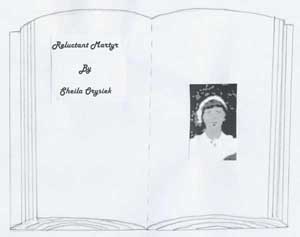 Editor's Note: This is the second chapter in our serialization of Reluctant Martyr, a historical novel by our columnist Sheila Orysiek. It is based on the experiences of her aunt. In each Friday-Saturday edition of San Diego Jewish World, we will run another installment of the 21-chapter book until its conclusion. We thank Sheila for granting us first publication rights to her book. Comments are welcome at sdheritage@cox.net Editor's Note: This is the second chapter in our serialization of Reluctant Martyr, a historical novel by our columnist Sheila Orysiek. It is based on the experiences of her aunt. In each Friday-Saturday edition of San Diego Jewish World, we will run another installment of the 21-chapter book until its conclusion. We thank Sheila for granting us first publication rights to her book. Comments are welcome at sdheritage@cox.net
Chapters 1 2 3 4 5 6 7 8 9 10 11 12 13 14 15 16 17 18 19 20 21
Reluctant Martyr—Chapter Two
Hannah’s family lived in a large beautiful house in southern Russia near a small village in the midst of a forest which her father owned. He also owned the lumber mills that supplied the towns and villages nearby with wood. The lovely home had been recently built and easily accommodated the family with three children and the servants who worked there. Every thought had been given to furnishing it elegantly and with care. A wide stately porch wrapped around the front and into the sides of the house. Before it stretched an expanse of a meticulously manicured lawn; but the house itself was sheltered under huge shade trees that cooled the summer's heat and broke the winter's wind.
Along the sides began the flower gardens, a fantasy of scent and color and directly behind the house was the vegetable garden and then acres of fruit trees. Also in back was a conservatory in which flourished the delicate plants, flowers and fruits that needed shelter from the change of seasons. It was all lovingly cared for by a gardener who shared his knowledge with Sharona, the wife and mother of the family. She was a devotee of gardening and often joined him on his rounds and directed his efforts. Sharona, Hannah's mother, also supervised all of the many tasks that it took to run the affairs of the household. She personally selected the food to be sure it met all the stringent dietary laws of a religious Jewish family.
Sharona had four brothers but the youngest, Joseph, was her favorite. Several of the family members owned fabric shops and Joseph often traveled abroad to buy cloth; it suited his restless nature. He had not as yet married and often visited his sister and her family, especially on Friday evenings for the Sabbath supper. The family always drew together for the Sabbath and a great deal of preparation was done so the household would be spotlessly clean. The table was set early, candles, china, silver and crystal all added to the luster of the gleaming dining room. Asaf, Hannah’s father, always brought home two or three poor students from the village to dine with the family. As each person came to the table the work the cares of the week were left behind and the peace of the Sabbath filled their minds and hearts. It was a joyous time and was celebrated each week without fail.
Hannah was attractive rather than pretty. She was small, slender and the bones of her face were delicately made; everything about her seemed fragile and patrician. A mass of short dark curls set off her pale translucent skin, her large dark eyes and a rosebud mouth. She dressed with great care. As befitted a young woman of a religious household, her clothes were modest but nonetheless she managed to make herself distinctive. It was important to her how she appeared.
Hannah spent her days acquiring an education and enjoying a constant round of family activities and entertainment. It was unusual for a family in a small town, at that time in history, to give a daughter an education, but Hannah was as educated as her younger brother though she had been schooled at home. Clothes, books, friends, visiting and theater made her life a joy. There had been no need to learn any household skills; servants did all that was necessary, and Hannah had no inclination toward household skills. It was a wonderful life in a beautiful setting.
But, the larger world was changing, there was political turmoil and in Russia a revolution was brewing. Hannah's Uncle Joseph, her mother’s brother, was a man of foresight and he could see the changes coming. He listened to the news of the war that had been far away and he heard the oncoming death knell of his lifestyle. Joseph went one evening to his sister’s house and was warmly greeted by Sharona and her husband, Asaf. After sending the children to bed, the adults sat by the fire in the beautiful parlor.
“Asaf,” Joseph began, “I have an idea I want your opinion on.” Asaf nodded as he gave his attention to his brother-in-law. A servant brought in tea and Joseph waited until the servant left before continuing. “I don’t like what is happening up north. Things are getting much more serious than I thought they would be. I think also that a full revolution is going to take place.” Sharona looked quickly over her shoulder to see if any of the servants may have overheard him. Joseph lowered his voice and leaned forward and he spoke intently. “Not only that, but it will be an opportunity for gangs to loot and kill and you know as Jews we will be the first to feel it.” Asaf nodded again and Sharona frowned with worry at her brother’s words. She knew these things to be true.
“Maybe, Joseph,” she said, “it won’t come here. After all this is a small town...”
“What is your idea?” Asaf asked.
“By the time we know if trouble will come here it will be too late. I’m not married and so I can easily leave. I’ll go to America as a passenger on a ship and then just stay there...”
“Joseph,” Sharona exclaimed, “perhaps it is not...”
But he went on, “I’ll get myself established there and then send for the eldest child of each of our immediate family, or as many as I can, like your Hannah.”
“No! No! Not Hannah!” Sharona was near tears. “She’s still so young!”
Joseph continued, “She can work and if necessary bring you all over. It could be very important for all our lives.”
“All you have said I know to be true,” Asaf agreed sadly, “but it is hard to let Hannah go. When will you do this?”
“I want to leave as soon as possible. Since no one is allowed to take much money out of this country, it will take me some time to get myself established and send for her.”
Even as Sharona sat dumbfounded with the thought of her young daughter leaving on such a dangerous journey, Asaf sadly agreed. “Let us know when you are ready for Hannah.”
Joseph was set on acting quickly and he wanted as little notice as possible taken of his departure. He felt only in that way did he have a chance of success in leaving Russia. “I’ll write to you,” Joseph said as he stood up and embraced his sister and her husband. Both Sharona and Asaf mentioned nothing of these plans to Hannah. They wanted to shelter her as long as possible.
Many months later a letter arrived at Hannah’s home from Uncle Joseph in America, the excitement of receiving the letter from that fabled far off land, was tempered by what it might contain. Sharona’s hands shook as she opened it. There could be no doubt now about the necessity of disrupting their lives. War was closer; they could easily see the smoke of it on their life’s horizon. So the train and ship tickets were purchased and Hannah was to meet another uncle in Cherbourg in France who would accompany her to the ship. The time had come to tell their daughter.
Asaf and Sharona sat in the big formal parlor of their home by a large window that looked out onto a lovely view of huge trees and a flowing green lawn. They could hear the faint clip of the gardener’s shears and the birds chirping as they fluttered in the tree branches. Asaf nervously flicked the newly arrived letter from Uncle Joseph with his fingers. “Get Hannah,” he said to Sharona, “I’ll take her to see the Rabbi. That will impress her with the importance of this whole idea.”
“Shouldn’t we tell her ourselves? After all we are her parents.” Sharona’s voice was already strained with tears.
“No, Sharona, I want the Rabbi to tell her. I’ll go there now to talk to him and you send her over in a short while.” He got up, took the letter, and left before Sharona could argue further. She sat a moment longer looking out the window and then went upstairs to Hannah’s room. She paused in the doorway and Hannah looked up. The girl was curled up on a red velvet cushion lying across the window seat; the deep dormer window made a perfect place to read. From her bedroom Hannah could see the flowering fruit trees below and a blue stream in the distance. A feeding box enticed birds to settle close by and the room was filled with their chatter.
“Mother, you look so serious! Is anything the matter?”
“Hannah, your father wants you to go to the Rabbi’s house very soon. Please put on a nice dress.”
“Why? What is it?”
“Don’t ask questions, just do it. Your father says so. Put on something nice and remember to cover your head.” Sharona quickly walked off to hide the tears that dripped down her cheeks. Hannah was very puzzled but then she suddenly realized that at age sixteen going to the Rabbi’s house could only mean one thing - marriage! Yes! That must be it! They all had someone in mind for her to marry.
She changed to a favorite dress and with growing excitement brushed her dark curls, then she bit her lips and pinched her cheeks for some color. The hall outside her room was empty but a maid waited at the bottom of the stairs to accompany her to the Rabbi’s house; it would never do to go out alone. They didn’t have too far to walk and for the servant it was a break from her chores to be out on such a nice day. Hannah was ready to skip with joy but she reminded herself to walk carefully and not stir up too much dust on her shoes.
The Rabbi’s widowed daughter let her in the house and the maid returned home. The Rabbi’s home was always rather dark and drear, his daughter kept the windows closed and the shades tightly drawn. Hannah took a kerchief from her pocket and tied it around her head, barely containing the lively dark curls. It took a few minutes before her eyes adjusted to the dim rooms as she was led to the Rabbi’s study at the back of the house. It was smothered in books. They lined every wall and stood in stacks on the floor and this room, too, was only dimly lit by the little sunlight that managed to filter under the drawn shades.
The Rabbi sat in a large over stuffed chair. He was an old man, revered, respected and imposing. Though not actually tall, his natural authority made him appear to tower over everything and everyone. His gray beard was neatly clipped and he had never been seen without a black hat. Thick brows contracted over piercing dark eyes; he was not a man to be contradicted. It was a moment before Hannah realized her father was also in the room, and she smiled at him. She was not surprised at his presence; after all as the head of the household, he would be the one to sign the engagement contract. The Rabbi pulled a stool forward for Hannah and she sat facing the two men. She was almost trembling with anticipation, for surely inside the envelope that the Rabbi held in his hands must be the name of the man she would marry.
The Rabbi put on his eyeglasses and took the letter out from the envelope. “Hannah,” he began as he fixed her with his gaze, “this is a very important letter.”
“Yes, Rabbi,” she said nodding her head.
“It’s from your Uncle Joseph in America.” The surprised look in Hannah’s eyes prompted the Rabbi to turn quickly to Asaf, “She knows Joseph is in America, doesn’t she?”
“Yes, Rabbi, she does.”
“Well, Hannah,” he continued, “your uncle is in America,” and then he turned again to Asaf. “Does she know why Joseph is in America?”
“Yes, Rabbi, she does, but that’s all she knows.”
What, Hannah wondered, does this have to do with my getting married? The Rabbi’s voice continued on, “You are only a girl but you are being given a great opportunity to help save your family.”
“Rabbi, I don’t understand...”
“You are sixteen, time to be responsible,” he answered.
“I thought you were talking about my getting....”
He interrupted her, “You will go to your Uncle Joseph in America and earn money in case the family needs to leave here. It’s a shame you are not a son, but your brother, Yarosh, is still too young. You are the oldest so you must go. It is your obligation to your parents to honor them.”
Hannah was completely taken aback. “Rabbi, I’m still studying with my teachers,” she said, her voice almost failing her.
“That’s foolishness anyway. A female doesn’t need school. Books! What good will that do you? It is your duty to leave, go to work, and establish yourself in America. Everyone in the family is depending on you. I think your father already has the tickets for the ship.”
Hearing the word “ship” Hannah turned to Asaf, her hands held out to him and cried, “Father!”
“Hannah, it is necessary,” Asaf said but his eyes were lowered and he didn’t look at her. Hannah stood up, her face pale; she was still not quite able to believe what had been said. Leave? Go to America? Earn money? How would she do that? The thoughts tumbled in her head and tears rushed to her eyes.
“No tears, Hannah,” the Rabbi ordered, “be strong. Asaf, you should have had a son first.”
A few days later when all of nature seemed at its loveliest, Hannah left her home. The fruit trees were heavy with blossoms and the birds still fed on seeds from the box outside her bedroom window. She was terribly upset and saw none of the beauty around her. The trip to the railway station was over much too quickly. The coach Asaf had hired drove along the country road in full sunshine and the fields on either side were plowed and ready for seed. No one in the family spoke, only the muffled hoof beats of the horses kept a steady rhythm. Sharona let the tears fall down her cheeks unchecked; Asaf swallowed and blinked. Yarosh was glad of a day off from school, he would have preferred going to America himself. He didn’t understand why everyone was so upset.
Hannah stood with her mother, father, brother and baby sister on the railway platform. The long journey would begin here - and end - she could not really imagine its end. As the train pulled out, Hannah looked back to see her mother’s face buried in the baby’s blanket in tears. The drive back to the house was unbearably sad; their oldest child gone, with no way to know if they would ever see her again.
A week later a milling throng of laughing people crowded the gangplank of a gleaming white passenger ship that was tied at the dock. The ship’s klaxon sounded and people began saying good-bye and moving more quickly. There were last minute hugs, gifts of flowers and waving hands. A small sixteen year old girl clutched the arm of an older man, her face was wet with tears and she was pale and shaking. Hannah was almost frantic at leaving her home, her parents and everything familiar to go all alone to a land across an ocean, foreign and frightening.
“Uncle, I’ll never see my home again. My parents, my family,” she cried.
“It’s up to you as the oldest to make a start in America for the family,” he said. “Uncle Joseph will meet you in America so you really won’t be alone.”
He walked her up the gangplank, hugged her tenderly, and returned to the pier. She clung to the ship’s rail as the gap of water slowly widened and the ship headed out to sea. Long after the land had faded over the horizon she stood, desperately lonely, but at last the coming darkness and cold forced her to find her cabin. This was such a strange turn of events. She had never known want or deprivation and certainly not loneliness. On the contrary, throughout her young life she had been surrounded by comfort and servants and most of all, family.
As Hannah sat in the dark cabin, the ship rose to meet the swells of the open sea and within moments she was ill. Her one suitcase was standing in the corner of the small but comfortable room, and as she went over to it waves of nausea overwhelmed her. She fell on the bunk and groaned through the night. Her stomach was churning; she was even too sick to cry.
The ship was one of the most luxurious liners of the day but Hannah, because of the seasickness, was never able to enjoy any of the wonderful food or the many activities. She heard laughter and people talking as they passed in the corridor outside her cabin. On the second day the uniformed steward came in to make up the room and discovered her lying there and from then on he brought her what little she was able to eat. The trip lasted about a week and Hannah was ill the entire time. One morning the steward came in and told her they were in New York harbor.
New York! America! Hannah forced herself up though her legs were unsteady, she went to the porthole and pushed open the glass. The ship had definitely slowed its motion though all she could see was open water. The cold air rushed in and helped her to recover. She quickly dressed, put on a coat, and went as fast as she could to the nearest deck rail. And, there it was, the skyline of dreams. The sunlight hit a thousand windows and roofs and turned them golden. The city seemed to sparkle. All the tenements, drab streets, dirt, struggle and poverty were not visible from her vantage point.
Instead of landing directly in the city, she was set down at an immigrant entry point and she stood in line with hundreds of people. While Hannah had traveled in a comfortable passenger cabin, others on the ship had spent their voyage in its depths in miserably crowded conditions. There were so many children and all of them seemed to be sick or crying or both; the eight day crossing had been hard on them. Mothers held babies in their arms and more children hung onto their full skirts. Kerchiefs covered the women’s heads and shawls were tucked in at their waists. Though no one was barefoot, holes could be seen in the bottoms of their shoes. Men, husbands and fathers, stood around in baggy pants; everyone was so rumpled and tired. All of the faces were a uniform gray from the stay below deck; it had been a dim world in the ship’s hold. There seemed to be more women and children than men, but perhaps this was because many of the men had preceded their wives to try to establish themselves, however precariously, and then had sent for their families.
The immigrants found themselves in a huge reception hall, drafty and uninviting. Windows high up on the wall allowed in some daylight but it only added to the drab effect of it all. Rows and rows of wooden slab benches were already filled with waiting people and each family, each mother tried to appear healthy and resolute, tried to hide the squalor and fear. One long line followed another; each held the frightening prospect of rejection and, indeed, in one line it came. The doctor gave each immigrant a fairly cursory physical examination, but when he came to Hannah he motioned her aside.
“Why, please?” she cried in dismay. A Russian speaking interpreter hurried over and conferred with the doctor.
“It’s nothing,” he assured her. “Another doctor wants to see you that’s all!”
“But why?” Hannah was close to panic.
“Have you been ill?”
“Yes, but it was from the ship rolling.”
“Well, then.....see it’s probably nothing!” But as he spoke he led her off to another room altogether. “Now sit here and don’t worry!” He smiled at her as he left. A more complete examination was given by another doctor and she heard the dreaded words “scarlet fever.” The illness of the past week had not been entirely seasickness.
Of the following two weeks there was little she later remembered except for long rows of iron bedsteads, brisk white nurses, and many sick people. A great number of sick children cried constantly and the dread of rejection hung over everyone. Hannah’s fever mounted and scarred her memory of that time, while on shore her “American” uncle waited and only through great effort learned what had happened to her.
Two long weeks later Uncle Joseph came again as Hannah was brought by barge to the pier in New York harbor. She was pale, thinner than usual and shivering in the cold. Since only a small knot of people awaited the landing of the barge, it was not too difficult for uncle and niece to find each other.
“Hannah,” he said, tears running down his face, “welcome to America.” They kissed and hugged one another. She was a breath from the homeland and the people he had left behind; his sister’s child. For her, he was all she had on this side of the ocean.
“Uncle Joseph, I was so afraid they would send me back and then I would have failed my family,” she sobbed with relief.
“Here, give me your papers and I’ll hold them for you. We have a long trip to get home.” He picked up her suitcase and held her arm to support her. It was comforting for her to have an adult to lean on again.
(

SAN DIEGO JEWISH WORLD THE WEEK IN REVIEW
Shoshana Bryen in Washington, D.C.: Maliki's victory: Iran's big setback in Iraq
Donald H. Harrison in La Jolla, California: The thought at the Red Sea: Si, se puede!
Michelle Rizzi in San Diego: Like or hate it, Atonement garners 'Whys?'
Ira Sharkansky in Jerusalem: Violence, not settlements, blocks peace
San Diego Builders of Israel, published by the United Jewish Federation of San Diego County in celebration of Israel's 60th year. Free download
Wyman Brent in Vilnius, Lithuania: So, how will a nice Gentile boy help to restore Jewish learning in Lithuania?
Carol Davis in San Diego: Racism, anti-Semitism, sexism combine in lesbian love story at the Diversionary
Alex Grobman in Englewood, New Jersey: Rabbi Herbert Friedman, founder of Wexner Heritage Foundation, dies at 89
Donald H. Harrison in La Jolla, California: Sha'ar Hanegev citizens familiarize themselves with Reform Judaism
Eileen Wingard in San Diego: A Jew and Muslim to make music together
Donald H. Harrison in San Diego: Fictional Israeli P.I. fails 'memorable' test
Sheila Orysiek in San Diego: What music performance means
Gary Rotto in San Diego: My, how San Diego AIPAC has grown
Dorothea Shefer-Vanson in Mevasseret Zion, Israel: Britain's descent into anti-Semitism
From SDJA Student Quarterly, reviews by students:
Harry Doshay in San Diego: Anthology's linup thrills jazz fans
Alexa Katz in San Diego: Mesquite Restaurant: A gem in Scripps Ranch
Michelle Rizzi in Del Mar: Pannikin: The Anti-Starbucks
Shoshana Bryen in Washington, D.C. South America's growing terrorist threat
Cynthia Citron in Los Angeles: Production celebrates Albert E, musically
Kathi Diamant in San Diego: My quest to solve a literary mystery
Donald H. Harrison in San Diego: Sha'ar Hanegev seeks rocket-proof school
Rabbi Dow Marmur in Jerusalem: Some advantages to a peace with Syria
Sheila Orysiek in San Diego: Miller's needle: Revenge in a tailor shop
Shoshana Bryen in Washington, D.C.: U.S. must lend support to Colombia as it fights narco-terrorists tied to Hezbollah
Charly Jaffe in San Diego: A teen's guide to Old Ladies
Rabbi Baruch Lederman in San Diego: The honor of service to veterans
Rabbi Dow Marmur in Jerusalem: Anti-Israelism: The new anti-Semitism
Rabbi Leonard Rosenthal in San Diego: On Post Bar/ Bat Mitzvah Letdown
Ira Sharkansky in Jerusalem: Why cynicism abounds in Middle East
And:
From the archives: We reprint from the 1953 Southwestern Jewish Press a trailblazing two-part series by Alice Craig Greene that exposed La Jolla's discriminatory housing policies against Jews
Link to previous editions
< BACK TO TOP
|
|

 —
—